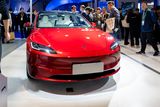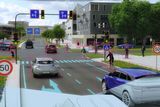Latest chip aims for AI revolution with human-like intuition
Graphcore chief technology officer Simon Knowles is leading a tech revolution
Graphcore CTO Simon Knowles is smiling at a whiteboard as he maps out his vision for the future of machine learning. He uses a black marker to dot and diagram the nodes of the human brain: the parts that are "ruminative, that think deeply, that ponder".
His startup is trying to approximate these neurons and synapses in its next-generation computer processors, which it's betting can "mechanise intelligence".
Artificial intelligence is often thought of as complex software that mines vast datasets, but Knowles and his co-founder, CEO Nigel Toon, argue that more important obstacles still exist in the computers that run the software.
The problem, they say, sitting in their airy offices in Bristol, is that chips - known as CPUs (central processing units) or GPUs (graphics processing units) - weren't designed to "ponder" in any recognisably human way.
Whereas human brains use intuition to simplify problems such as identifying an approaching friend, a computer might try to analyse every pixel of that person's face, comparing it to a database of billions of images before attempting to say hello.
That precision is massively inefficient for AI, burning huge quantities of energy to process all the relevant data.
When Knowles and the more business-minded Toon founded Graphcore in 2016, they put "less precise" computing at the heart of their chips, which they call intelligence processing units, or IPUs. "The concepts in your brain are quite vague. It's really the aggregation of very approximate data points that causes you to have precise thoughts," says Knowles.
For machine learning systems, which need to process huge and amorphous information structures known as 'graphs', building a chip that specialises in connecting nodelike data points may prove key in the evolution of AI.
"We wanted to build a very high-performance computer that manipulates numbers very imprecisely," Knowles says.
Put another way, Graphcore is developing a brain for computers that, if its co-founders are right, will be able to process information more like a human instead of faking it through massive feats of number crunching.
"For decades, we've been telling machines what to do, step by step, but we're not doing that any more," Toon says, describing how Graphcore's chips instead teach machines how to learn.
"This is like going back to the 1970s - we need to break out our wide lapels - when microprocessors were first coming out. We're reinventing Intel."
Investor Hermann Hauser, co-founder of Arm Holdings which controls the most widely used chip designs, is betting that Knowles and Toon's IPUs will unleash the next wave of computing.
"This has only happened three times in the history of computers," Hauser says - CPUs in the 1970s, GPUs in the 1990s. "Graphcore is the third. Their chip is one of the great new architectures of the world."
Graphcore has raised $328m (€291m) from investors, including BMW, Microsoft, and Samsung, and was last valued in December at $1.7bn. It declined to comment on specific applications for its chips, but given its investors, some seem obvious - self-driving cars, Siri-like voice assistants, and cloud server farms.
But Knowles is most excited about humanity-altering applications, such as the impact IPUs could have on complex analysis that scientists need for research in climate change and medicine.
In layman's terms, Graphcore has sliced up mammoth computing undertakings into mini data problems, which are each handled separately on those "tiny islands of processors", before they sync up to share what they learn at the most efficient moment.
Tobias Jahn, principal investor at BMW's venture capital arm, envisions Graphcore chips in its data centres and perhaps its cars. "BMW has an interest in Graphcore becoming a large-scale, worldwide silicon supplier," Jahn says.
Graphcore says it's on track to reach $50m in revenue. Gartner analyst Alan Priestley said: "Graphcore has a good position, but it's still a very small competitor compared to Nvidia. So although their IPUs may be better than Nvidia's GPUs for these workloads, the risk they face is customers choosing 'good enough' over 'brilliant.' "
Another significant challenge is the ethical dilemma IPUs present if they enable machines to operate 100 times more powerfully than today's computers. Toon and Knowles are wary of the dangers, particularly how such technology could be misused for weapons and authoritarian surveillance.
"Machine power gave us airlines and cars," Knowles says. "But it also gave us tanks. Society will have to determine the balance of good and evil over time."
Bloomberg Businessweek
Join the Irish Independent WhatsApp channel
Stay up to date with all the latest news














